ANSWERS TO SOLAR'S MOST FREQUENTLY ASKED QUESTIONS
As more members explore the pros and cons of installing solar, United’s Energy Solutions team has fielded countless questions from curious members. Below is a list of the most common solar-related questions.
Does United have any advice for members considering solar?
Yes, our biggest recommendation is to first tackle as many energy-efficiency projects in the home as possible. By decreasing a home’s electric usage, a smaller and therefore less expensive solar system can be considered. Many energy efficiency projects offer quicker return-on-investment opportunities when compared to a solar system. United is here to help members identify and achieve their specific energy goals. Sign up for a free home energy audit today.
How many solar installation quotes should members receive?
United recommends receiving a minimum of three quotes from different solar installers. There is currently a wide array of pricing in the solar market. Generally, those who sign their first and only quote run the risk of paying significantly more than those who compare and negotiate between multiple offers. First, review and understand United’s net metering, buyback policy, and interconnection process (please see below).
What research should be performed before signing a solar contract?
- First, review and understand United’s net metering, buyback policy, and interconnection process (please see below).
- Second, members should speak with a tax professional or CPA about the potential for a Federal Income Tax Credit (FITC). Purchasing solar becomes much more attractive if a member qualifies for the entire 30 percent credit.
- United also recommends speaking with insurance professionals to determine if policy adjustments are needed to cover solar equipment.
- Lastly, speaking with a realtor can provide insight into potential changes to market value and desirability.
Does United partner with any solar installers?
United is excited to announce a new solar installation offering for its members. The cooperative’s new solar solution now takes members from solar education all the way to installation through a third-party installer. United decided to offer this service to its membership in order to educate members and allow members to make an informed decision after being presented with all the facts. To learn more about United’s solar solution, please click here.
There have been many reports of contractors in United’s territory that are claiming to have a partnership with United. Please keep in mind that United, and United’s third-party contractor, do not go door to door soliciting business. Nor does United or United’s third-party contractor participate in telephone sales. To speak with one of United’s Energy Solutions team members today, call (817) 556-4000.
How long is the return-on-investment (ROI) for a solar system?
There are many factors that can affect the ROI of a solar system, including the total cost and size of the system, as well as United’s rates. Those who install solar could be eligible for a 30 percent FITC. It is important to speak with a tax professional or CPA to determine eligibility for the FITC.
The ROI can extend several years if the full tax credit is not received. Additionally, paying cash for a solar system can significantly reduce overall cost due to the lack of interest charges. Overall, members who pay cash for solar through a third-party contractor can expect an ROI of about 15-20 years. If financed, the ROI is generally about 20-25 years. If electric rates decrease in the future, the ROI will be extended. If a member purchases a system through United, paying cash, the average ROI is reduced to approximately 10-13 years.
How are solar accounts billed?
Accounts with 50 kW DC and below are net-metered, which means members are billed monthly on the difference between the energy delivered to their homes or businesses and the energy received by United during the billing cycle.
- Solar Underproduction (Net Consumer)—If United delivers more kWh than what is received from a solar system, the received kWh are credited back at retail cost and the net energy is billed to the member. Beginning in 2023, all members will be billed a securitization charge due to Winter Storm Uri based on the total energy delivered. For example, if United delivers 1,000 kWh and receives 800 kWh from the solar in a month, the member will receive a bill for the 200 kWh net difference, plus securitization charges on the 1,000 kWh delivered.
- Solar Overproduction (Net Producer)—When the energy supplied by the member exceeds the energy supplied by United during a monthly billing period, the member will be responsible for a minimum bill ($32.50 for residential accounts) plus securitization charges on the total kWh delivered. Any excess kWh will be purchased back at that month’s avoided wholesale power supply costs and deposited into a banked balance on the account. The accrued bank balance will be automatically applied to that month’s minimum bill, securitization charges, and other electric charges, such as area lights. Any remaining banked balance will be applied to future energy charges.
- If you'd like to view sample DG bills for the two scenarios above, CLICK HERE.
Will members still have a bill with solar?
When the energy supplied by the member exceeds the energy supplied by the cooperative during a monthly billing period, the member will be responsible for a minimum bill ($32.50 for residential accounts) in addition to securitization charges for delivered kWh. Any accrued banked balances will be automatically applied to that month’s minimum bill, securitization charges, and other electric charges, such as area lights. It is possible for the banked balance to satisfy the electric portion of the bill resulting in a total electric due of $0. It is important to note that the banked balance will not be applied to United's internet service charges.
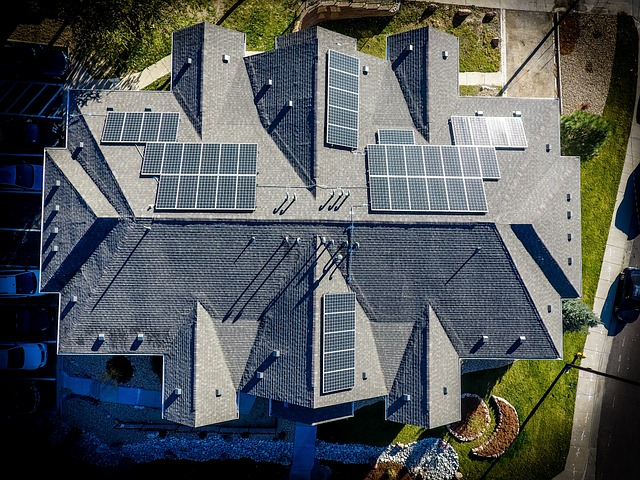 What will happen to any remaining banked balances at end of year?
What will happen to any remaining banked balances at end of year?
If the member has an unused banked balance left over at the end of a calendar year, United will issue a check for balances greater than $20 and credit the member’s account for balances equal to $20 or less. The banked balance is reset in January of each calendar year.
What size system should a member install?
The total size of a solar system will vary depending on the usage history, location of panels, and ultimate goals of the member. United will net meter any solar system 50 kW DC and below. An average home would not need to install a system anywhere near this maximum net-metered size. United does not recommend oversizing a system in excess of the yearly energy needs. This recommendation is in place to maximize United’s net metering policy and retail credits (under-production), instead of receiving wholesale credit for over-production kWh along with the minimum bill and applicable securitization charges.
Can one system offset multiple meters?
United does not currently offer “virtual-metering.”
Each metering point is billed independent of one another. Therefore, any over-generation on one meter will not be used to offset the usage of another meter.
If solar is purchased for multiple meters, there will need to be individual, properly sized systems interconnected to each metering point.
How does the process for installing solar usually go?
-
The first step of installing solar is choosing a trusted solar company.
-
After signing, the solar company will then complete and send United a solar application on the member’s behalf.
-
United takes approximately three to four weeks to review applications from the date of submission. During this review process, United will confirm that the system conforms to United’s requirements and will inform the installer of any required changes.
-
Once the installer receives approval from United, the installer is free to install the system. If the installation is within city limits, the solar company will need to obtain an installation permit from the municipality.
-
After the installation is complete and has passed city inspection, if applicable, the solar company will notify United that the system is ready for United’s field verification.
-
United’s field verification will generally be completed within a week from notification that the system is ready.
-
The system can stay on once the system passes United’s field verification and Permission to Operate (PTO) is granted.
***If a member purchases a system through United, these steps are still followed by our third-party contractor to make sure all contractors follow the same process.***
Are there any fees associated with a solar installation?
United does not currently charge any application fees for solar. The only fees that may be incurred include infrastructure upgrades. These costs, if applicable, will be billed to the solar contractor for payment. Each installation is individually evaluated during the application review process, to determine if United’s infrastructure will accommodate the specific solar system.
Why does solar monitoring not match the received reading on my bill?
United only receives excess solar energy that the home does not consume behind the meter, not total production from the system. As solar is being produced throughout the day, the home actively pulls from the solar production first. At any moment, if there is more energy being produced than demand in the home, United will receive the excess solar energy through the meter.
Will my solar continue to operate during an outage?
Unless a solar system has backup battery storage, the home will lose power during an outage. Grid-tie solar systems operate in parallel with the grid and are unable to back feed onto the grid during an outage for the safety of linemen.
Is it better to purchase or lease a solar system?
It is often more advantageous to finance than to lease a solar system. Once a loan is paid off, financed systems will continue to produce power until the system’s end of life, whereas leased systems will be removed after a predetermined number of years. Additionally, members that lease systems are unable to claim the FITC.
How long do solar systems last?
Most solar panels are warrantied for 20-25 years. Panel manufacturers certify their products against hail, high winds, and extreme temperatures to simulate real-world exposure. In general, solar systems that utilize credible products have about a 30-year life expectancy.
How is United Community Solar different?
United Community Solar is a voluntary program that the co-op offers its membership to pass on some of the savings received from large solar facilities. This program does not involve installing physical solar-related equipment at the member’s residence. There is a waiting list at this time as it is fully subscribed.
Will I still be able to participate in Community Solar?
Net-metered accounts cannot participate in the community solar program. There is potential in the future that United will be able to provide our net-metered accounts with the option to participate in our community solar program.
If a member installs solar behind their metering point, and switches off the community solar rate, the ROI of their solar installation is typically extended a few years. This is due to the savings they are realizing by being on the community solar rate and a lower price per kWh.
United will continue serving as a trusted source of information. Please contact a member of United’s Energy Solutions Team for any questions regarding solar or your energy needs.
LET US HELP YOU WITH YOUR RENEWABLE PROJECT
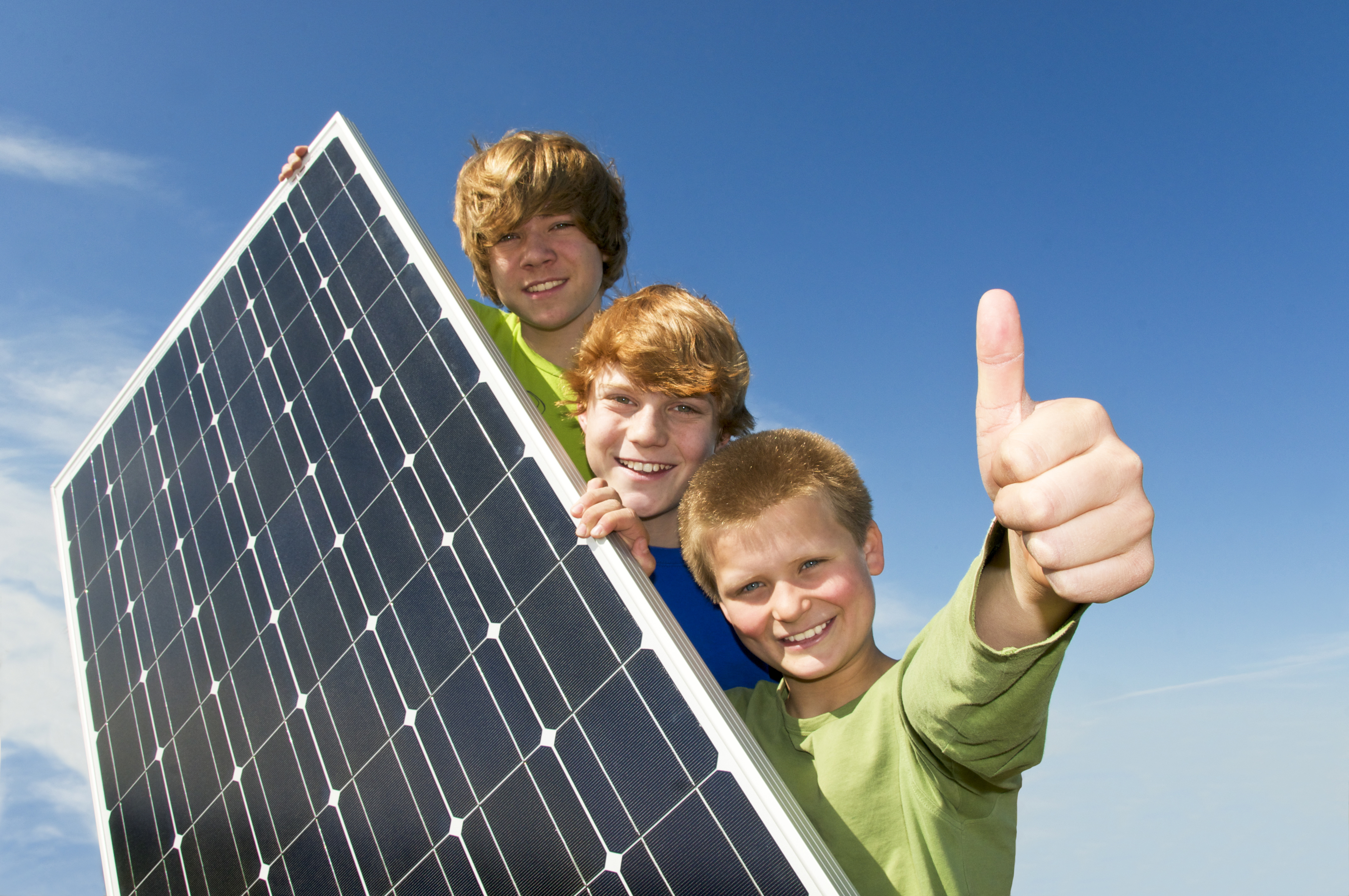 When homeowners connect renewable resources, such as wind and solar power, to the grid, it is also called Distributed Generation (DG). It's one of the four components of Energy Innovation (the other three include Conservation, Energy Efficiency and Demand Response). United's trusted energy advisors stand ready to answer member questions about the practicality, costs and technological requirements of DG, which continues to grow in popularity.
When homeowners connect renewable resources, such as wind and solar power, to the grid, it is also called Distributed Generation (DG). It's one of the four components of Energy Innovation (the other three include Conservation, Energy Efficiency and Demand Response). United's trusted energy advisors stand ready to answer member questions about the practicality, costs and technological requirements of DG, which continues to grow in popularity.
DG is defined as generation that is connected to a utility’s distribution system. It generally refers to small scale generation that is located near the point of end use. Common DG system energy sources are solar, wind, landfill gas, diesel fueled engines, and natural gas fueled micro-turbines.
If you are wondering, considering or about to start the process of installation of one of these types of generation systems, take some time to peruse these pages and give one of our trusted energy advisors a call.
We recommend the following resource:
The Public Utility Commission of Texas*
*While the PUCT rules are intended only for Investor-Owned utilities, United’s Tariff and DG Guidelines follow closely with the related Substantive Rules, though with minor differences. Therefore, all proposed DG installations will be measured against the United Tariff and DG Guidelines and not the PUCT rules and guidelines.
Disclaimer: This information is not intended to be fully inclusive of all current, future or pending rules and regulations, but is meant to provide general information pertaining to this subject.
Distributed Generation Interconnection and Parallel Operation Requirements Contact
Seth Rosser
Energy Solutions Manager
email: interconnections@ucs.net
THE TEN STEPS TO INTERCONNECTION
- Review the Following to Ensure Compliance with UCS Policy:
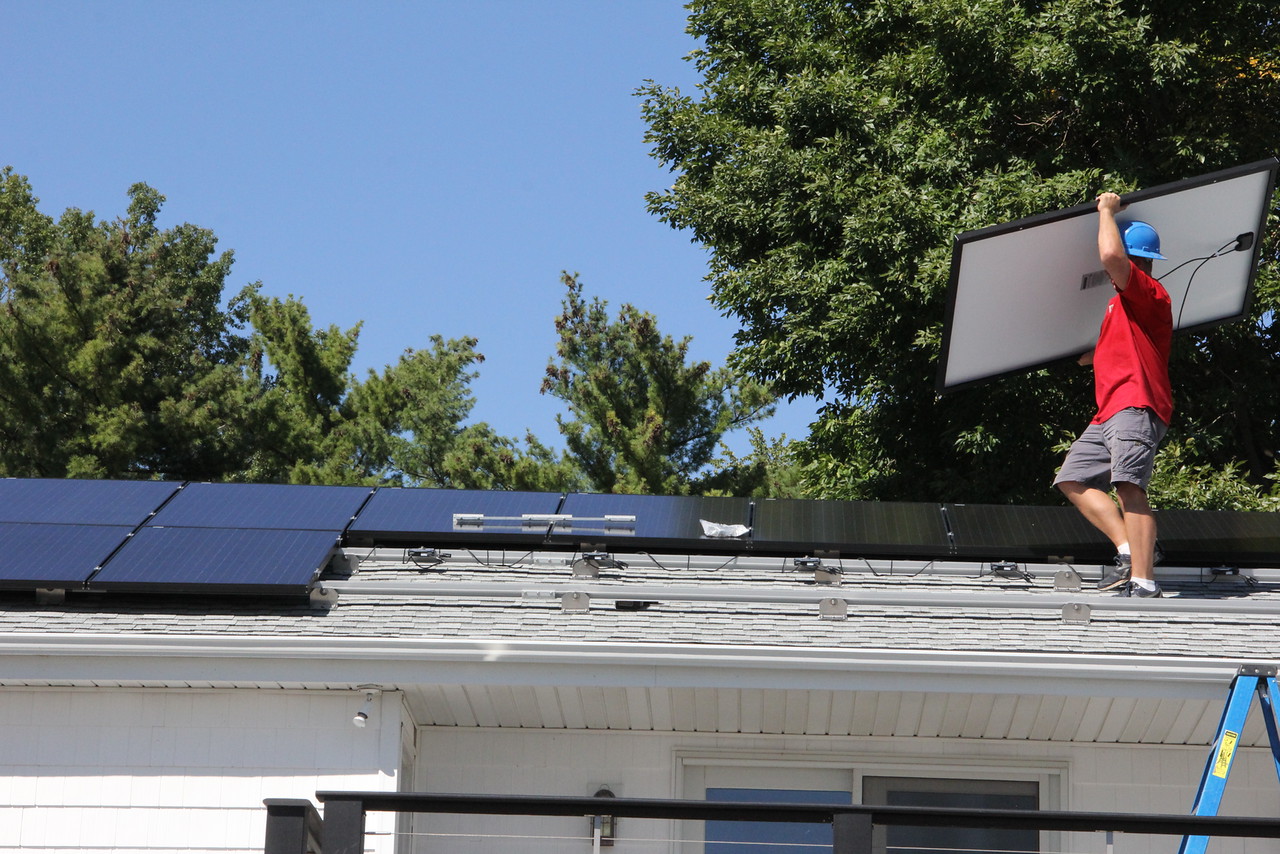 2. Submit Interconnection Application and Supporting Documents
2. Submit Interconnection Application and Supporting Documents
Download a copy of the Application for Interconnection, review it and submit a copy to UCS.Submit a one-line diagram or schematic showing the electrical design of the generating installation, including equipment for interconnection with the Cooperative’s system.UCS may require additional documents.
- Sign and Submit Interconnection Agreement
Stating that the member is agreeing to and will meet all the terms in the Agreement.
- Sign and Submit Energy Smarts DG Grant Application and Provide Copy of Invoice or Quote/Estimate
Click here to see if an Energy Smarts Grant is available for your particular installation.
- UCS Review of Application and Supporting Documents
UCS will review the application and supporting documents and notify the member whether permission is granted to proceed with the installation.
- Comply with Extension Conditions (if required)
If extension of UCS’s facilities is necessary to complete interconnection, members will be required to comply with conditions of the Line Extension Policy.
- Comply with Applicable Laws
It is the member’s responsibility to make sure their power generating installations comply with applicable federal, state and local laws, ordinances and regulations.
- Complete Construction
Construct the power generating installation and install a disconnect switch, warning/safety labels, and other protective equipment as may be required by the Cooperative to protect its personnel, facilities and operations.The system may be turned on briefly for testing but must remain off until verified and approved by UCS Personnel.
- Notify UCS of Completion
Notify the Cooperative in advance of energizing your small power generating installation and allow UCS staff to verify and test protective equipment.Upon completion, please notify UCS by sending an email to interconnections@ucs.net. For a quicker response, please follow the steps below:
- In the subject line please include the word “Verification.”
- In the body of the email please provide your installation/service address, account number and the name on your UCS account.
Once UCS receives the notification of completion, a UCS Energy Advisor will contact you to schedule a date and time for a site visit to verify the installation.
- Site Visit and Verification
A representative from UCS will meet member at the site to review the system size, the systems disconnect and safety features.The Energy Advisor will discuss billing and perform a free home energy audit the day of the verification.
- In the event there are conditions preventing safe interconnection and proper parallel operation, UCS will notify the member.
- The member may not interconnect or initiate parallel operation until such conditions are corrected and written notification has been provided to UCS.
After the disconnect switch and safety features have been reviewed and approved, a UCS representative will sign the Interconnection Agreement and leave an executed copy of agreement with the member.
Disclaimer:
The Cooperative disclaims any expertise or special knowledge related to the design or performance of generating installations and does not warrant the efficiency, cost effectiveness, safety, durability or reliability of generating installations.
In the event the member moves from the location of interconnection, the property owner will need to contact UCS and notify the Co-op of their intent to move from the property.
Please notify UCS when increasing the size of an existing generating facility.
Distributed Generation Interconnection and Parallel Operation Requirements Contact
Seth Rosser
Energy Solutions Manager
email: interconnections@ucs.net
HOW MUCH DOES SOLAR OR WIND ENERGY COST?
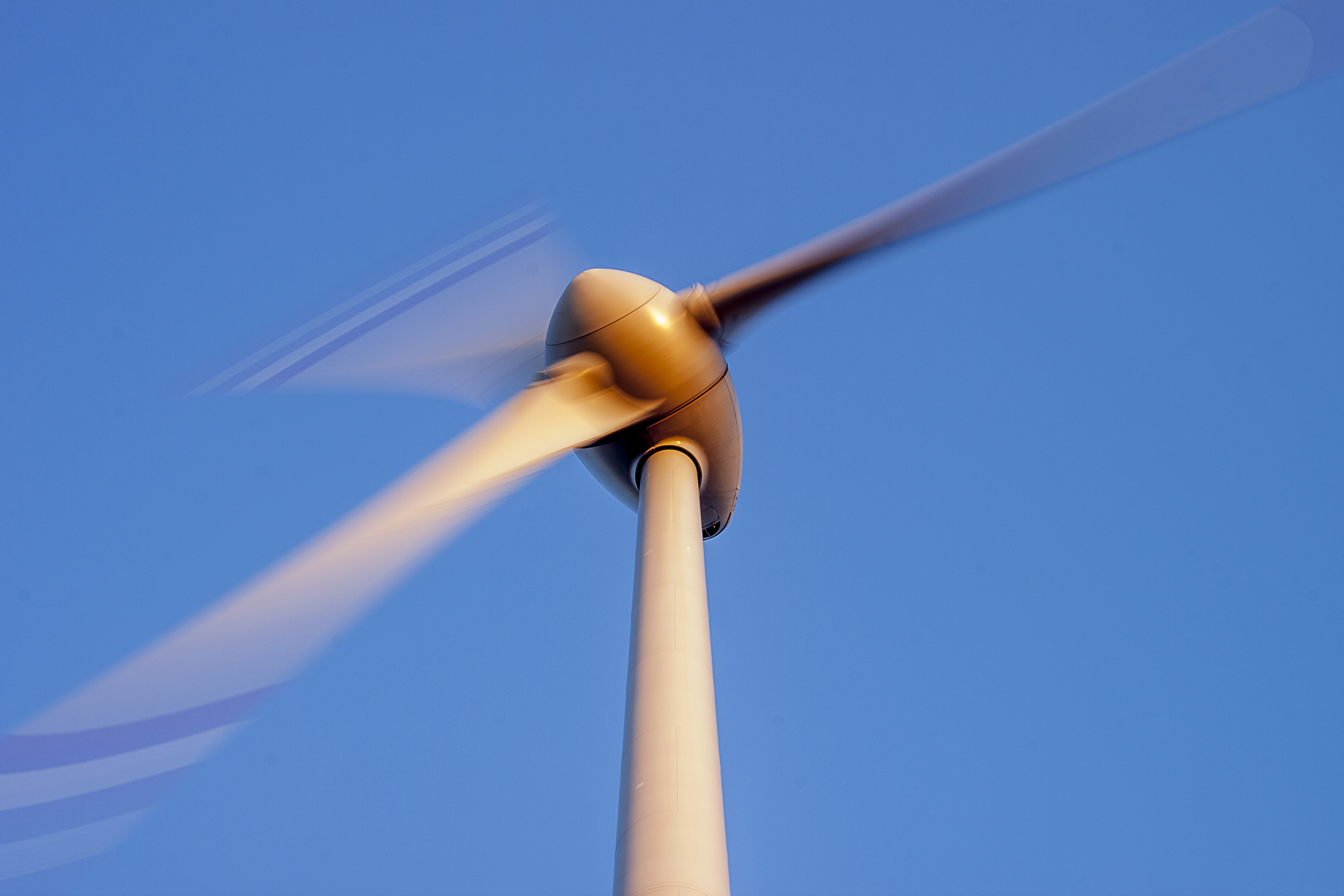 One of the most common questions asked by members seeking information about installing DG at their home or business is installation cost.
One of the most common questions asked by members seeking information about installing DG at their home or business is installation cost.
Wind Power – 10 kW System:
Approximate cost (installed) – $45,000 to $80,000. Actual cost depends on several variables, such as tower height and style, difficulty of excavation, etc.
Solar Power – 13.2 kW System (average system size):
Approximate cost (installed) – $3-$3.25 per watt. Actual cost depends on several variables, such as ground-mounted vs. roof-mounted systems, system size and difficulty of installation. A 13.2 kW solar array costs approximately $42.900 (based on a cash purchase). Expect this solar array to generate about 20,119 kWhs annually if roof-mounted on a 20-degree tilt facing South in Cleburne, according to the PVWatts calculator. To see production from one of United's Demonstration Projects, click on the United DG Demonstration Project tab on this page for more.
Distributed Generation Interconnection and Parallel Operation Requirements Contact
Seth Rosser
Energy Solutions Manager
email: interconnections@ucs.net
GRANTS AVAILABLE FOR SOLAR AND WIND INSTALLATIONS
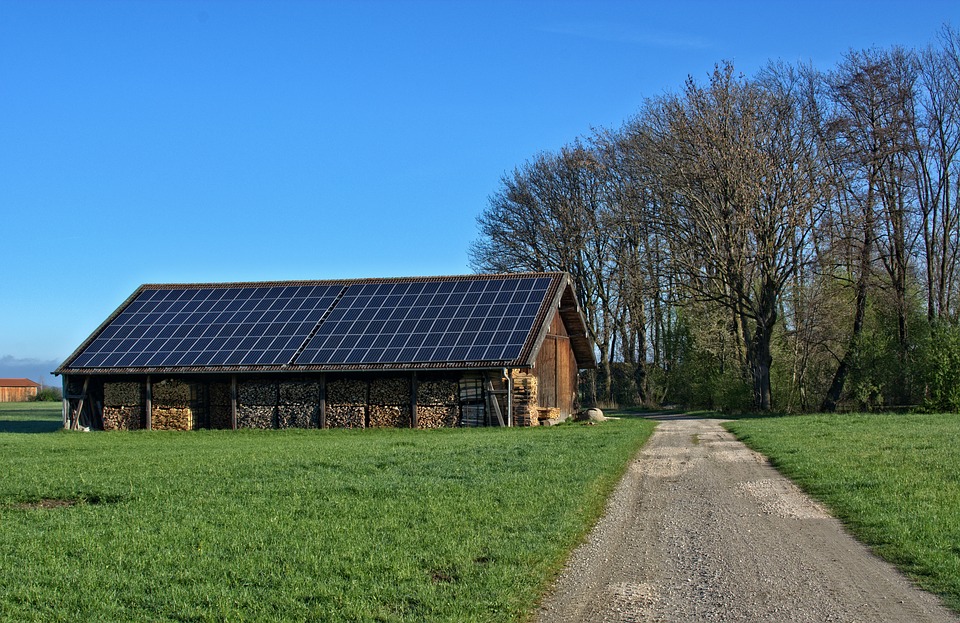 Residential DG Grants
Residential DG Grants
Residential members who install approved photovoltaic/solar DG systems at the residence in which they receive electric service from United are eligible for one grant per unit at a maximum of two grants per member. The DG installation must be completely installed and operational in the calendar year the grant is provided, meet United’s DG specifications and be inspected by a United representative prior to receiving a grant. The DG installation must be on property served by United. Existing DG units and rental properties are not eligible for grant funding. Invoices are required for grant funding approval. Grants will be capped at $100 for PV/solar applications. The interconnected DG capacity must meet or exceed 1,000 watts (1 kilowatt).
Commercial, Industrial or Agricultural DG Grants
Commercial & Industrial, as well as Agricultural members who install approved photovoltaic/solar DG systems at the location in which they receive electric service from United are eligible for one grant per unit at a maximum of two grants per member.The DG installation must be completely installed and operational in the calendar year the grant is provided, meet United’s DG specifications and be inspected by a United representative prior to receiving a grant. The solar DG installation must be on property served by United. Existing DG units and rental properties are not eligible for grant funding. Invoices are required for grant funding approval. Grants will be capped at $200 for per application, maximum of two grants. The interconnected solar DG capacity must meet or exceed 5 kilowatts per installation.
Applications for an EnergySmarts DG Grants can be obtained HERE
Distributed Generation Interconnection and Parallel Operation Requirements Contact
Seth Rosser
Energy Solutions Manager
email: interconnections@ucs.net
LEARN HOW RENEWABLE WORKS WITH UNITED'S DEMONSTRATION PROJECTS
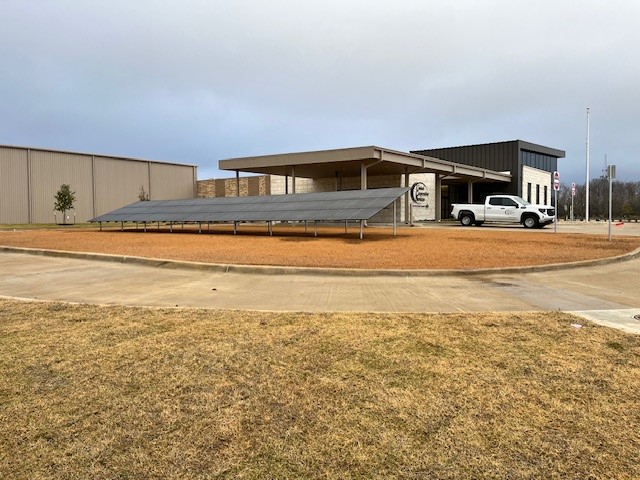
- Interest in renewable energy systems continues to grow, but sometimes choosing the right type of unit can be daunting for consumers.
- To help members obtain a real-world expectation for their potential renewable energy installations, United has implemented several DG demonstration projects at local offices utilizing different technologies in each installation.
- To view real-time production data from United’s newest solar installation, located at the Mansfield office, click HERE.
Key Facts About This Solar Array
- Designed by United Cooperative Services
- 13.2 kW ground-mount facing south
- Approximately 20,479 kWh estimated solar production annually
- 33 Tier 1 solar panels (Phono Solar Technologies)
- 33 Enphase Microinverters (IQ8A)
United's Learning Lab Sites Include:
DG Burleson Solar is a 2.3 kW Schuco array with SMA Sunny Boy inverter.
DG Burleson Wind is a 10 kW Bergey Excel wind turbine.
DG Granbury Solar is a 1.125 kW SolarWorld array with PV Powered inverter.
DG Granbury Wind is a 2.4 kW Southwest Windpower Skystream wind turbine.
DG Mansfield Solar is a 13.2 kW Phono array with Enphase Microinverters.
DG Meridian Solar is a 3.95 kW tracking Trina solar array with SMA Sunny Boy inverter.
DG PK Lake Solar is a fixed 1.26 kW Kyocera array with PV Powered inverter.
DG Stephenville is a 6 kW Phono array with a Solis inverter and Tigo rapid shutdown devices.
Distributed Generation Interconnection and Parallel Operation Requirements Contact
Seth Rosser
Energy Solutions Manager
email: interconnections@ucs.net

